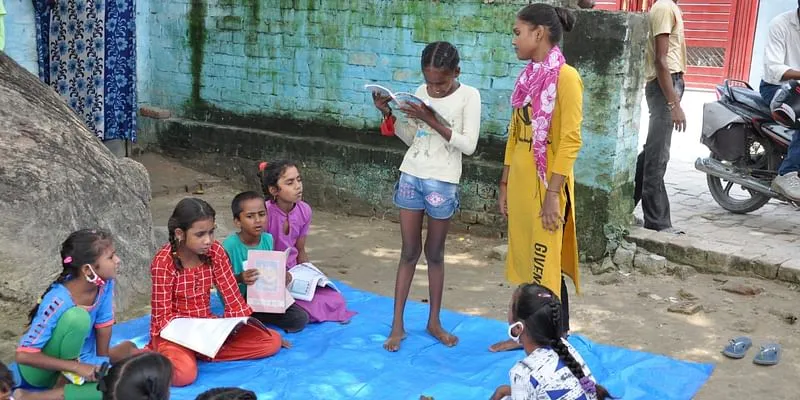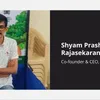How this 17-year-old from UP’s Raebareli helped children from marginalised sections study during the pandemic
When the children in Kallu Ka Purwa, a hamlet in UP’s Raebareli district, couldn’t attend school due to the pandemic, Kavita Jaiswal started teaching them through Oxfam India’s Mohalla School, ensuring there was no gap in their education.
Kavita Jaiswal is a Class XI student from Kallu Ka Purva, a small hamlet in Raebareli, Uttar Pradesh.
She is lucky; she is able to attend school in the town. The school in the hamlet offers education only until Grade V, after which many parents get reluctant in sending their girls to the town for further studies.

Kavita Jaiswal teaching at the Mohalla School
The onset of the pandemic in 2020 and the subsequent lockdowns made it difficult for girls to even access basic education as they had no recourse to online education when schools closed. This is when Kavita started teaching them through Oxfam India’s ‘Mohalla School’ – making sure that there is no gap in learning.
“Higher education is a dream for most girls here. Even if parents are open to sending their girls to the nearby town for further schooling, they are worried about the anti-social elements in the area and the rampant incidents of eve-teasing. Education is indeed a privilege here,” Kavita tells HerStory.
The 17-year-old has always been fond of teaching and used to regularly offer lessons to her siblings and some children from neighbouring houses.
“When the school shut down during the pandemic, school officials and representatives from Oxfam asked if I could teach the mohalla children. I was excited and agreed immediately,” she says.
Kavita’s mother – the president of the School Management Committee (SMC) at Kallu Ka Purva Primary School (Raebareli) – encouraged her daughter to teach the children for a few hours every day.
Binod Kumar Saha, Programme Co-ordinator, Oxfam India explains how they started Mohalla Schools.
“We noticed that children were suffering from learning loss, and at many places, were at risk of dropping out of school as well. The same concern was shared by parents at the SMC forum meeting. They suggested a solution that if someone could take classes in their own village/ hamlets, they would be able to cope up with the issue.”
This is how the idea of organising Mohalla Classes took root, and later, SMC leaders took the initiative to engage teachers, Gram Pradhan, and village volunteers.
“Initially, teachers were sceptical of visiting the villages to train volunteers due to the fear of catching COVID-19, so we came up with a solution. It was decided that the teachers will provide orientation to volunteers over the phone and if they faced any problem in teaching, volunteers will take support from them,” he adds.
Learning is continuous
Oxfam India identified around 120 such volunteers in Raebareli and Banda districts and provided them with support and training with the help of government teachers and enabled them to take mohalla classes in their own neighbourhoods.
Around 120 volunteers were trained with the help of Gram Panchayat and school teachers.
In Kallu Ka Purwa, the primary school and Oxfam officials arranged for Kavita to take Mohalla School classes at a field not too far from the school. She says initially, parents were sceptical to send their children due to the fear of contracting COVID-19. Along with her mother, she had to personally visit many families to convince them that all safety protocols such as social distancing would be in place and the children have to be masked at all times.
After this, the challenge of the availability of books and teaching material. Once again, SMC members suggested that they could use the library books and took full responsibility for their upkeep. Teachers too were okay with the idea and this is how the SMCs managed to distribute books to ensure children continued their education until the schools resumed teaching.
Starting off with 10 children, the Mohalla School at Kallu Ka Purwa grew to include more than 30 students who regularly attended the one-and-half-hour long daily classes to learn English, Maths, Science and other subjects.
“Since the children had not attended school for almost three months since the lockdown began in March, they had forgotten a lot of what they had learnt. Their confidence levels were low, and they were hesitant to speak up. It took some time, we persevered together and we got the children back on the learning track,” says Kavita.
The past month has seen children going back to school but Kavita hopes to continue teaching a few of them from home.
Binod says, “Children who attended classes during lockdown through Mohalla Classes got enrolled in government schools when they opened. But there is a need to provide additional classes for those who have resumed school so that they can attain age-appropriate learning. Again, efforts are being taken to identify some volunteers who can initiate classes in the village.”
As for Kavita, she is looking forward to studying electronics and taking up a job. But teaching remains her passion and she will continue giving lessons to children.
Edited by Kanishk Singh








